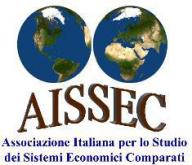Edited by Luca Bortolotti, University of Turin and OEET
In the last decades, with the emergence of Global Value Chains (GVCs), the tasks and functions for the production of goods and services have become increasingly specialized and fragmented accross different countries. On the one hand, this phenomenon, as well as macro-regional networks, has played a role in boosting growth in many developing and emerging economies. Indeed, while building whole industries from scratch can be hardly achieved by developing countries, entering in specific phases of production is much easier. On the other hand, GVCs can trigger unbalances, inequality, marginalization of the working class (particularly in high income countries) and environmental degradation, creating a context more vulnerable to climate crisis and shocks in international prices and logistics. Moreover, the integration of developing countries in GVCs is often limited and, when it occurs, reserves the larger share of value added to high-income countries.
The importance of GVCs poses new challenges also for the academic research, both at theoretical and empirical level. The understanding about whether and how participating in GVCs can promote economic development is crucial for emerging economies. But the micro-level data on firms’ international operations along the value chain remains largely beyond the reach of national accounts and statistics which are not designed to capture this kind on information. Analysis relies on data on trade and foreign direct investments’ flows, input-output datasets, or on micro level data, but in all cases, scholars dealing with GVC, have to address important methodological issues in their analyses.
Newsletter n. 20 | December 2021 - Download PDF
The role that GVCs can play in the process of economic development was at the core of the recent 7th OEET workshop on Emerging economies in Global Value Chains: impacts and policy issues. The three articles collected in this newsletter are based on works illustrated during the 7th workshop. Through different methodologies and datasets, they suggest novel perspective to measure the relation between economic development and participation in GVCs.
The first article, by Andrea Coveri and Antonello Zanfei, is: Functional specialization in FDI and Value Capture in GVCs. This article tests empirically the smile curve hypothesis, which assumes that the activities with higher share of value added occur in the intangible-intensive stages (during the pre- and post-production phases), rather than in the production operations. This division of labour has asymmetric implications for the high-income and developing economies, as the former are specialized in intangible-intensive activities, and the latter in production operations. By analysing data on foreign direct investments, the authors provide a picture of the new international division of labour and its evolution over the years. Then, considering the domestic value-added content of exports, they investigate the distribution of value added along the GVCs.
The second article, by Ivan Savin, is: Measuring market selection: state of the art and ways forward. This article suggests examining the GVCs by applying the model of replicator dynamics. This perspective adopts an evolutionary approach -as opposed to the neoclassical one- and explains the market selection of firms (i.e. the market share they acquire over time) with their “fitness”, which can be further conceived in terms of labour productivity or product quality. The differences and complementarities among different ways of analysing market selection are described, highlighting their strengths and drawbacks.
The third article, by Nora Aboushady and Chahir Zaki, is: Firms’ Political Connections and Global Value Chains: Evidence from Egypt. This article is a case study that investigates which factors limit the integration of Egypt in GVCs. The Middle East and North Africa region, and especially Egypt, is an area whose linkages with GVCs are relatively weak. By adopting data from the World Bank Enterprise Surveys for Egypt, the authors examine in depth the role of political connections and non-tariff measures in preventing deeper and more fruitful participation of the county in GVCs.









